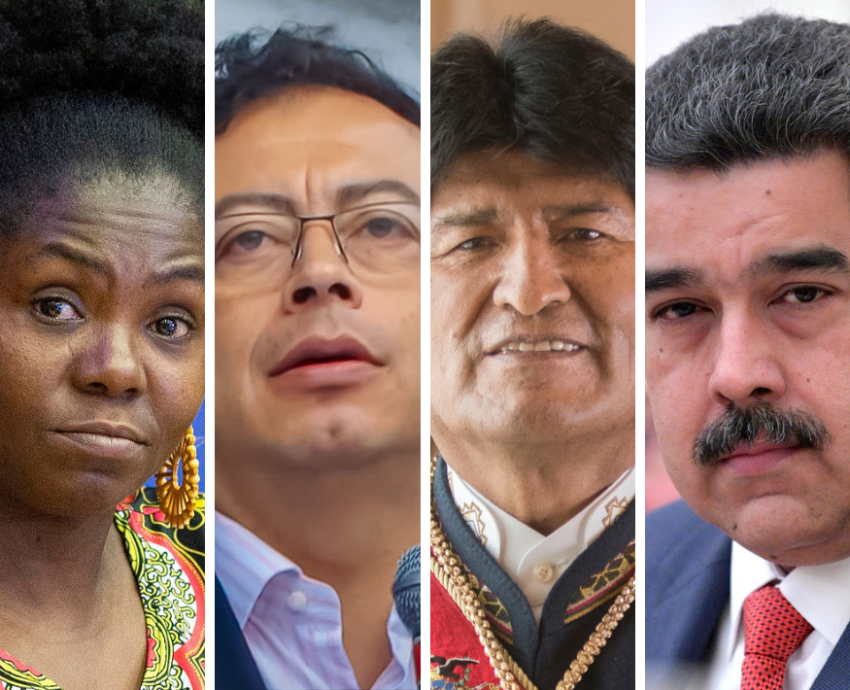
Recent comments from current and former United States government officials reinforces the imperialist approach ingrained in US foreign policy towards Latin America.
Prompted by Colombian President Gustavo Petro’s impending inauguration, Republican Senator Ted Cruz launched into a tirade on the senate floor on August 4 about the “acute dangers to American national security” posed by leftist governments in Latin America.
Cruz said he is “deeply worried” that “Colombia will join the ranks of anti-American forces in Latin America”.
Gustavo Petro leads Colombia’s first leftist government, after decades of right-wing regimes with close ties to the US.
Cruz’s speech reflects a genuine fear among proponents of US imperialism that Colombia, “an indispensable ally to the United States”, may to try to break from decades of US hegemony.
Should this occur, Cruz said that “[US] foreign policy should use carrots and sticks in order to incentivise other countries to behave in a way that benefits American interests”.
Cruz ended his speech with a threat: “Any leftist leader who chooses socialism will be held accountable by the United States.”
Former Bolivian President Evo Morales — who was ousted by a US-backed right-wing coup in 2019 — denounced Cruz’s comments and said Cruz is “financed by arms manufacturers” and is “a promoter of coups”.
“[He] now falsely accuses the people of Colombia of ‘threatening and putting at risk the security of the United States’, along with other countries in the region, for having democratically elected leftist governments.”
“For Cruz, his Republican accomplices and arms bosses, ‘democracy’ is installing military bases and imposing economic blockades and coups,” said Morales.
The US supported efforts to destabilise the Morales government from 2005, including funding and supporting a failed coup in 2009.
Morales’ program of resource nationalisation, welfare programs and Indigenous sovereignty represented a threat in the eyes of US imperialism.
The US played a leading role in the 2019 coup which ousted Morales, and supported the ensuing year-long far-right repressive regime of “Interim President” Jeanine Áñez.
Coup strategy
A week after Cruz’s speech, US National Security Council Director for Western Hemisphere Affairs Juan González told Colombian media that previously the US would not have accepted a leftist government in Colombia.
“Forty years ago, the United States would have done everything possible to prevent the election of Gustavo Petro,” he said. “And once in power it would have done almost anything possible to sabotage his government.”
González hurried to reassure that such approaches were “[US] policies of the Cold War”, implying that this no longer occurs.
Despite such reassurances, former US national security advisor John Bolton boasted during an interview on CNN in July about his involvement in coup plots against elected Venezuelan President Nicolás Maduro.
Bolton served under Donald Trump’s government from 2018–19. During this time, the US government publicly supported a failed coup against Maduro in January 2019, an unsuccessful military coup months later and ramped up economic sanctions against Venezuela.
Bolton said that US support for coup plots were “necessary to protect [US] interests”.
US sanctions
Cruz’s comment that Cuba and Venezuela “used to be prosperous countries until leftists came to power”, belies the role the US government plays in destroying economies in order to trigger regime change.
The US government imposed harsh economic sanctions against Venezuela in August 2017, an oil embargo in January 2019 and a general embargo in August later that year.
Bolton admitted in his 2020 memoir, The Room Where It Happened, that US sanctions were aimed at “driving the state-owned oil monopoly’s production as low as possible … to crash Maduro’s regime”.
Bolton revealed the US government’s motivations: control of Venezuela’s oil reserves, when he told Fox News on January 28, 2019, that “it will make a big difference to the United States economically if we could have American oil companies invest in and produce the oil capabilities in Venezuela”.
Frustrated with the sanctions’ lack of success, Trump discussed a military invasion of Venezuela with anti-Maduro figures in the country, according to former Secretary of Defense Mark Esper’s memoir.
Although failing to bring about the expressed intention of regime change, the sanctions crippled Venezuela’s economy, causing widespread poverty and misery.
Research from the Center for Economic and Policy Research in 2019 estimated that US sanctions caused more than 40,000 deaths in Venezuela from 2017–18.
Even some US congresspeople called on President Joe Biden to lift sanctions against Venezuela, in an open letter on May 10.
The letter said the sanctions “have achieved little but the widespread suffering of the Venezuelan people” and are one of the “leading causes” of suffering.
“Attempts to foment a military uprising, threats of armed intervention, the termination of all relations with Maduro and his allies, and the imposition of far-reaching sanctions served only to deepen Venezuela’s political crisis.”
In Cuba, the US government has maintained a 60-year-long blockade “to weaken the economic life of Cuba … to bring about hunger, desperation and overthrow of government” — in the words of former Deputy Assistant Secretary of State for Inter-American Affairs Lester DeWitt Mallory, in April 1960.
These days, the US mostly employs a soft coup strategy, such as funding opposition groups in the region, media disinformation campaigns and “democracy promotion” policies.
There are several well-documented examples in this century of the US government, directly and indirectly, undermining leftist governments in Latin America through coups, economic sanctions and destabilisation campaigns, such as in Paraguay, Honduras, Haiti, Ecuador, Brazil, Nicaragua and Cuba.
US foreign policy is never about “promoting democracy”, but protecting and extending its imperial interests in Latin America.